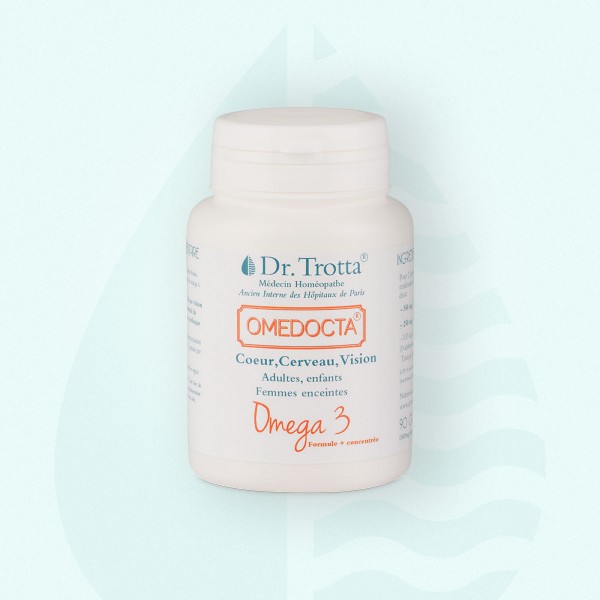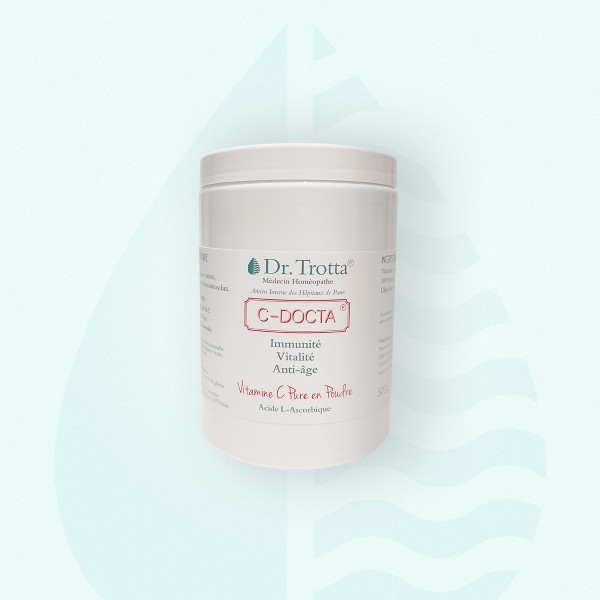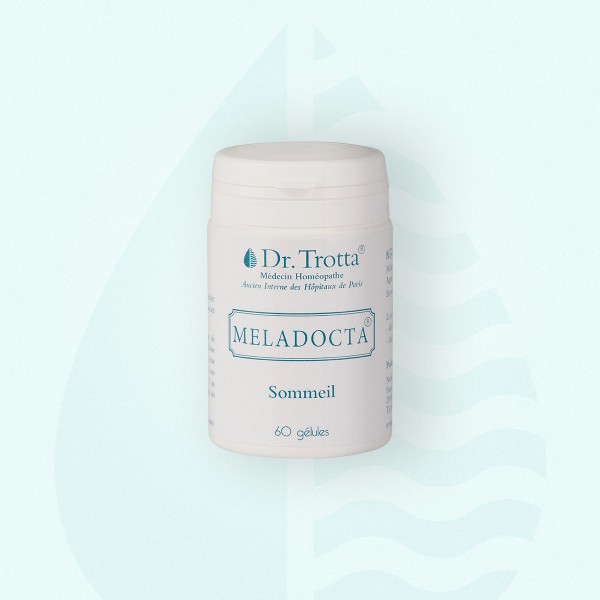Introduction
Age-related macular degeneration (AMD) is an ocular pathology that affects the macula, a small area in the center of the retina essential for fine vision and detail. AMD is one of the main causes of blindness in people over 50, and its incidence is rising steadily as the population ages. Very disabling, it can lead to severe loss of central vision, making daily activities such as reading or recognizing faces extremely difficult.
Nutrition and health
A diet rich in antioxidants is crucial to preventing AMD. Antioxidants help combat oxidative stress, one of the main causes of AMD. We recommend eating colorful, antioxidant-rich foods and beverages such as fruits and vegetables (spinach, carrots, blueberries), and drinking green tea. On the other hand, it is important to eliminate pro-inflammatory and oxidizing foods such as wheat, milk and sugar, which can aggravate inflammation and oxidation of the retina.
Food supplements
OMEDOCTA: Dr Trotta’s omega-3s
Omega-3s are essential for retinal health. They provide the polyunsaturated fatty acids needed for retinal cells to function properly. Taking one capsule of OMEDOCTA every day before breakfast can help nourish the retina effectively. OMEDOCTA
- A study carried out by Inserm has demonstrated that the combination of antioxidants and omega-3 fatty acids is beneficial for the retina. Nutritional supplements enriched with these substances effectively protected rat retinas against degeneration[1].
- According to an article published by the AMD Association, consumption of oily fish, rich in long-chain omega-3s, enables better integration of these fatty acids in the retina, thus reducing the risk of AMD[2].
- The Cochrane review published a study indicating that trials conducted in the USA and France on the use of fish oil supplements in people with AMD showed promising results in slowing the progression of this disease[3].
🌐 Sources
- inserm.fr – Combining antioxidants and omega-3s is beneficial
- association-dmla.org – AMD, the action of omega-3 on the retina
- cochrane.org – Omega-3 fatty acids to prevent and slow the progression of AMD
C-DOCTA: Dr Trotta’s vitamin C
Vitamin C is a powerful antioxidant that protects the retina from oxidative damage, particularly that caused by UV rays. Daily intake of C-DOCTA can significantly reduce oxidation and aging of the retina. C-DOCTA
- A study published by the Age-Related Eye Disease Study (AREDS) research group has demonstrated that vitamin C supplementation can slow the progression of age-related macular degeneration (AMD). This study, a randomized, placebo-controlled clinical trial, showed significant beneficial effects of these supplements on AMD prevention[1].
- A review published in the American Journal of Ophthalmology has highlighted the protective effects of antioxidants, particularly vitamin C, on the retina. Antioxidants can reduce oxidative stress, which is a key factor in the development of AMD. The study highlighted the importance of high-dose nutritional supplements for the prevention of this disease[2].
- Another randomized, placebo-controlled study examined the effect of vitamin C supplementation on the progression of lens opacities and visual acuity loss. Although the study also focused on cataracts, the results show that high-dose antioxidants, including vitamin C, have beneficial effects on overall eye health, including the retina[3].
🌐 Sources
- ncbi.nlm.nih.gov – Nutrients for Prevention of Macular Degeneration and Eye
- researchgate.net – A Randomized, Placebo-Controlled, Clinical Trial of High
- researchgate.net – AREDS report no. 8. Arch Ophthalmol;119:1417-1436
MELADOCTA: Dr Trotta’s melatonin
Melatonin is renowned for its antioxidant and repairing properties, particularly for neurons. As AMD affects the neurons of the retina, MELADOCTA is an indispensable supplement for repairing these cells during the night. MELADOCTA
- A study published on PubMed in 2005 showed that melatonin has the ability to control age-related macular degeneration (AMD). This study demonstrated that melatonin could play a protective role against the severe vision loss associated with this disease[1].
- A 2021 paper published in Frontiers in Pharmacology explored the therapeutic effects of melatonin on eye diseases, including AMD. The research highlighted that melatonin protects retinal integrity and could thus help prevent macular degeneration[2].
- A 2016 review by Blasiak et al, published on PubMed, discussed the potential role of melatonin in retinal physiology and pathology, specifically in the context of AMD. The article suggests that melatonin may benefit photoreceptors and retinal pigment epithelium, two areas affected by AMD[3].
🌐 Sources
- pubmed.ncbi.nlm.nih.gov – Effects of melatonin in age-related macular degeneration
- frontiersin.org – Therapeutic Effects of Melatonin on Ocular Diseases
- pubmed.ncbi.nlm.nih.gov – Melatonin in Retinal Physiology and Pathology: The Case
4o
Dr. Geffard’s endotherapy
Endotherapy is an innovative approach using nanoparticles to treat neurological diseases in an environmentally-friendly, non-toxic way. This therapy specifically targets damaged cells in the retina, offering an effective solution for AMD. Endotherapy
Hydrogen, the gas that heals
Hydrogen is a powerful antioxidant capable of penetrating retinal cells to neutralize free radicals. Specialized goggles are now available that diffuse this gas directly onto the eyes. Three-day treatment courses are available to initiate this therapy and halt the progression of AMD. Hydrogen therapy and courses
- A study published in Scientific Reports has shown that drinking hydrogen-enriched water improves photoreceptor structure and can potentially help prevent age-related macular degeneration (AMD). The results indicate that hydrogenated water may have significant protective effects on the retina[1].
- Research published in MDPI Pharmaceuticals in 2023 explores the emerging role of molecular hydrogen in the treatment of eye diseases. Clinical and experimental animal studies have demonstrated hydrogen’s promising therapeutic potential for retinal diseases, including AMD[2].
- Another study, published in Therapeutics and Clinical Risk Management, discussed the potential uses of hydrogen as a promising therapeutic strategy against various retinal diseases, including AMD. Hydrogen, as an anti-inflammatory and antioxidant agent, offers a new avenue of treatment for these conditions[3].
🌐 Sources
- nature.com – Drinking hydrogen water improves photoreceptor structure
- mdpi.com – Novel Role of Molecular Hydrogen: The End of Ophthalmic
- dovepress.com – The potential utilizations of hydrogen as a promising
Conclusion
AMD is not inevitable. Thanks to preventive measures and innovative natural treatments, it is possible to slow or even halt its progression. By combining diet, dietary supplements, endotherapy and hydrogen treatments, we can limit the need for intra-ocular injections and increase their effectiveness. A natural, integrated approach is the key to better managing and treating AMD. Three-day treatment courses are available to initiate this therapy and halt the progression of the disease. You can find out more about these courses here.





